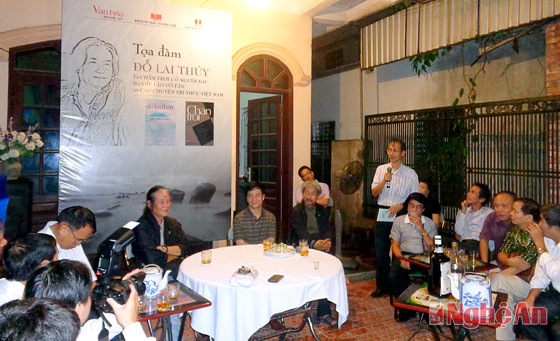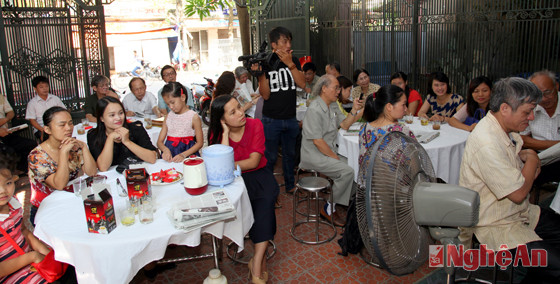Book Introduction Seminar: Building and Developing a Reading Culture
(Baonghean) - After the success of the book introduction seminars that created a remarkable impression: "Literary memories", author Ho Phi Phuc; "Do Lai Thuy - From "The horizon has people flying" to "Waving into infinity" with the story of Vietnamese intellectuals"... up to now, the coordinating units have decided to periodically organize a book discussion every month. Regarding this issue, Nghe An Newspaper reporter had an interview with Associate Professor - Dr. Phan Huy Dung - Deputy Head of the Faculty of Literature Pedagogy (Vinh University) - the co-organizing unit, who directly participated in the discussions as a speaker.
Reporter:Dear Associate Professor - Dr. Phan Huy Dung, could you share your feelings about the book introduction seminar format that the Faculty of Literature Pedagogy, Vinh University Publishing House, and Nghe An Culture Magazine have been and are coordinating to implement?
Associate Professor, Dr. Phan Huy Dung:In my opinion, the Book Introduction Seminar is a really necessary activity. First of all, it is necessary for the parties to coordinate the organization. For the Faculty of Literature Pedagogy, Vinh University, this is an opportunity for people to know more about the faculty: in addition to training and research, the faculty also has other meaningful activities to serve the two key activities mentioned above. For Nghe An Culture Magazine or Vinh University Publishing House, this is an opportunity for the units to affirm the meaning of their existence in the scope and field of assigned activities, affirming their responsibility to the public and the whole society.
 |
| Associate Professor, Dr. Phan Huy Dung (standing) discussed at the book introduction seminar by author Do Lai Thuy. |
For authors whose books are introduced, the discussion creates opportunities for them to interact with the public and readers, to listen to comments and evaluations of their works. Through the exchange, "mutual understanding" between authors and readers is established and maintained; feedback from the public is captured by the author, from which necessary adjustments can be made.
Through these seminars, readers have the opportunity to meet and exchange with authors and “experts”. From there, the need to read introduced or related works will be formed and stimulated. The seminars are not only meaningful to the direct participants but also have the ability to create a wider resonance once they are reported on the mass media. From this perspective, it can be seen that Book Introduction Seminars are truly necessary activities for building and developing a reading culture.
Reporter:In your opinion, what is the significance of the Book Introduction Seminar in orienting reading culture in today's life?
Associate Professor, Dr. Phan Huy Dung:It can be said that organizing a book introduction seminar achieves many goals at the same time, aiming at the larger goal of serving the community, building and developing a reading culture. Before the seminar, the authors and publications introduced may not be known to many people, and can easily be hidden among countless other authors and publications. The same goes for the content of the seminar. When it is not mentioned, it may not be recognized as an “issue” that needs attention. Through the discussions at the seminar, people will clearly see what is a “hot” issue, one that is truly meaningful.
More specifically, through the discussion, the public will be suggested the coordinates of books to read. There are many books and each book has enough reasons to be introduced and read. However, for readers, reading culture is only formed when they determine the area of books to prioritize reading. After that, the scope of books to read will gradually expand along with the expansion of understanding of relevant issues.
In fact, the quality of the discussion, high or low, the positive suggestions of the discussion, more or less depends largely on the quality of the comments and exchanges. For example, the discussion about two books by Do Lai Thuy. The issue of defining the concept of intellectuals, Vietnamese intellectuals, the issue of the status of intellectuals when raised and discussed will immediately lead readers to think of books about intellectuals that need to be read such as "Russian Intellectuals" by Tri Thuc Publishing House, think of recent debates in the press about the title of intellectuals, think of works in which intellectual characters are expressed by Nam Cao, Nguyen Huy Tuong, Nguyen Khai, Ma Van Khang, Nguyen Xuan Khanh, Ho Anh Thai, ... Thus, the discussion about a specific book is a positive start, leading readers to find many other books to have an overview of the issue being discussed.
The seminars also have the meaning of advising on how to read, how to detect problems, how to grasp the ideas, arguments, and core of the book, of the author. What the author says about his book in the seminar is worth listening to, even though it is essentially just one opinion among countless opinions. For readers, information about the process of writing the book and the author's concerns help us have more data to form our own evaluation arguments.
Consulting on reading methods is closely linked to consulting on how to express attitudes and opinions towards books. Coming to the discussion means coming to polite and frank exchanges with the spirit of respecting the interlocutor and respecting different opinions. This is certainly a positive suggestion for building a culture of debate, which is very problematic in our country today. There is a close relationship between reading culture and debate culture. Only when there is reading can there be debate, and only when there is debate can reading activities reach the necessary depth. All require a cultured and standard behavior.
Reading culture is not only about reading a lot of books but also about choosing the right books to read and forming the habit of expressing opinions in a cultured way. Reading, in a certain perspective, is also about finding information and learning how to process information from books.
 |
| Readers attend the book introduction talk by author Ho Phi Phuc. |
Reporter:It is known that after 3 successful book introduction seminars, the coordinating parties have decided to organize a regular seminar once a month. How do you evaluate the “potential” of the author, the work, and the issue to choose to organize the seminar on a long-term basis?
Associate Professor, Dr. Phan Huy Dung:I think the development potential of book introduction seminars is huge. There are many good works that need to be introduced to meet the increasing cultural needs, cognitive needs, and aesthetic needs of the public. Of course, I am referring to the books published through official channels. In response to the requirements of the trend of integration and national reconciliation and harmony, in response to the need to eliminate complexes to create a combined strength to develop the country, the responsibility of critics and researchers in introducing authors and books to the public is quite heavy. There are still many creative fields, many works by many authors in different regions and periods that have contributed to the history of Vietnamese literature that need to be illuminated by the light of intelligence and science to clearly recognize their true values.
In addition to introducing specific works, there are many topics that can be discussed such as: identifying and explaining trends in literature; explaining reception trends or current reading needs of readers... For example, why are bookshelves full of romance novels now? Or what should we read at this time, which works? Issues about the attitude and responsibility of intellectuals in the face of current events, or the generational limits of artists in each period, era... These are truly "problematic" topics, always arousing the need to learn, recognize, and exchange.
Even the creative activities of Nghe An authors from the past to the present still contain many potential issues that can be selected as the content of the discussion. And it is necessary to affirm that the discussion is an activity to honor new discoveries and thoughts, honor the sense of dedication of writers, researchers, and critics for the bright future of Vietnamese culture and literature. This is not a place to express the spirit of "cronyism" or factionalism, nor is it a place to praise any individual, but a place to suggest the right ways and approaches to culture, literature, and books, in the spirit of selfless service.
Reporter:Thank you very much, Associate Professor, Dr. Phan Huy Dung!
Ngo Kien(Perform)






